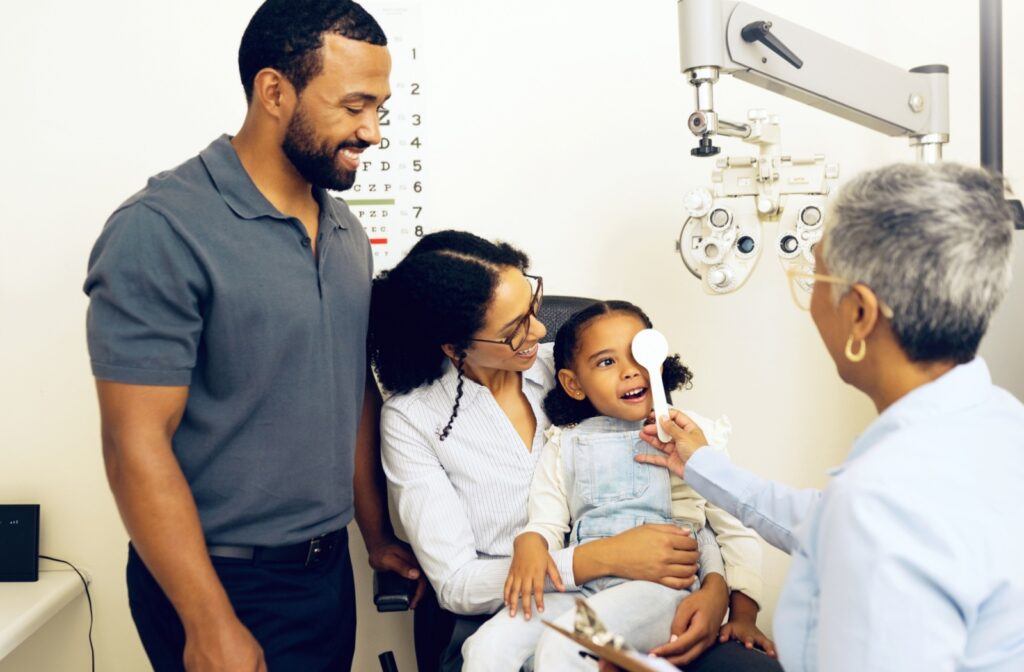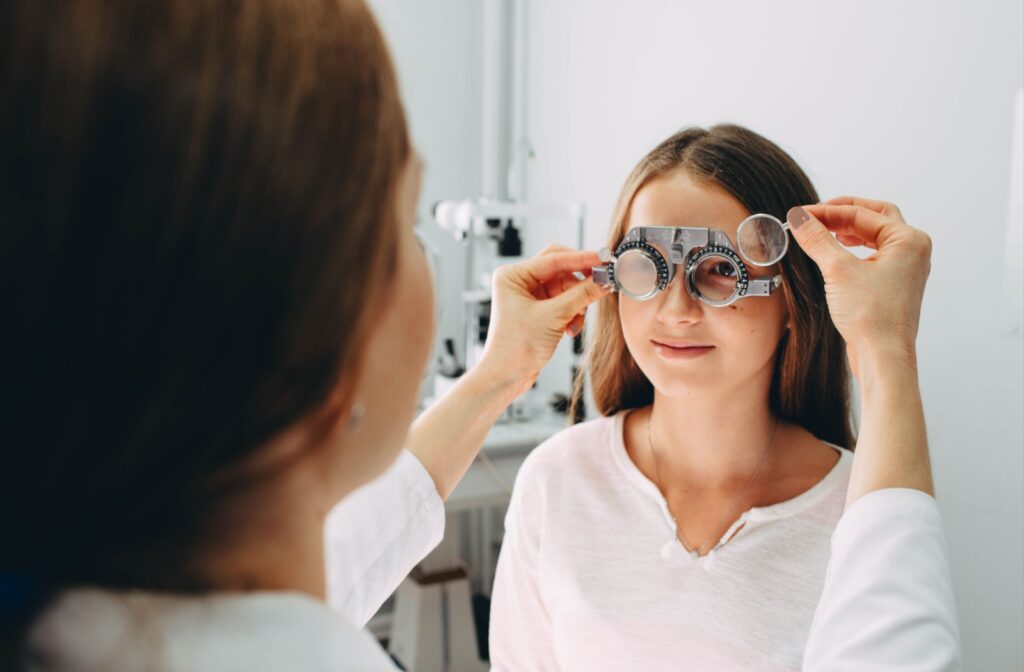Eye exams are about much more than reading letters on a chart—they provide an in-depth look at your overall vision and eye health. A comprehensive eye exam is a detailed evaluation that checks your vision, eye function, and the health of the structures inside your eyes. These exams are essential for detecting changes early, protecting your vision, and maintaining lifelong eye health.
More Than Just a Vision Check
A comprehensive eye exam is a thorough check-up of your eyes and vision using a variety of tests and technology. Unlike quick vision screenings, these exams go beyond determining if you need glasses or contacts. They give your optometrist valuable insight into your eye health, and can even reveal signs of systemic health issues.
During the exam, your optometrist evaluates:
- Clarity of vision at different distances
- Eye coordination and muscle function
- Peripheral (side) vision
- Eye pressure (to help detect glaucoma)
- The health of the retina and optic nerve
By combining these assessments, your optometrist can build a complete picture of your eyes and overall health.
Why Regular Eye Exams Are Important
Your eyes go through many changes over your lifetime. From childhood through adulthood, your vision can shift gradually, sometimes without you even noticing. Regular eye exams help track these changes and are corrected with updated prescriptions when needed.
But eye exams are about much more than seeing clearly. Many eye diseases begin silently, with no noticeable symptoms until damage has already occurred. Comprehensive eye exams can detect these conditions early, when treatment is most effective.
Conditions an Eye Exam Can Detect
- Refractive errors (myopia, hyperopia, astigmatism, presbyopia)
- Glaucoma
- Cataracts
- Age-related macular degeneration (AMD)
- Diabetic eye disease
- High blood pressure–related eye changes
By catching these issues early, you can protect your vision and overall health.
What to Expect During an Eye Exam
If you’ve never had a comprehensive eye exam—or it’s been a while—you might be curious about what the process involves. Here’s what typically happens:
Before the Exam
Bring along any helpful information, such as:
- Your current glasses or contact lens prescription
- Medications you’re taking
- Details about your family’s eye health history
- Notes about any changes or unusual symptoms in your vision
This helps your optometrist personalize your exam.
During the Exam
The main portion of your exam involves several tests that assess different aspects of your vision and eye health:
- Visual acuity test: Measures how clearly you see at various distances.
- Refraction test: Determines your glasses or contact lens prescription.
- Eye muscle and alignment tests: Check how well your eyes work together.
- Peripheral vision test: Looks for blind spots that may indicate glaucoma or other issues.
- Tonometry: Measures the pressure inside your eyes.
- Optical coherence tomography (OCT): Provides detailed images of your retina and optic nerve.
The combination of these tests allows your optometrist to detect both common and more serious eye conditions.
After the Exam
Your optometrist will review the results, address any questions you may have, and determine whether you require an updated prescription or additional care. If a concern is found, they’ll outline the next steps to keep your eyes healthy. Most comprehensive eye exams take about 30–60 minutes, depending on whether additional testing is needed.
How Often Should You Have an Eye Exam?
The recommended frequency for eye exams depends on your age and individual risk factors:
- Children under 18: Annually, to monitor eye development and catch vision problems that may affect learning.
- Adults 18–64: Every 2 years, unless vision changes occur sooner.
- Adults 65+: Annually, as age-related eye conditions become more common.
- People with diabetes or other eye health risks: Annually, since these conditions can increase the likelihood of vision complications.
Even if you fall outside these guidelines, it’s important to listen to your eyes. If you notice changes in your vision or experience symptoms such as flashes of light, sudden blurriness, or eye pain, you should book an exam sooner rather than later.

Eye Exams in Saskatoon
If you live in Saskatoon, your eyes face unique challenges—from the dry prairie air to cold, harsh winters that can lead to irritation and dryness.
Regular eye exams are one of the best ways to protect your long-term vision and overall eye health. Whether it’s tracking changes in a child’s eyesight, managing age-related conditions, or keeping your prescription up to date, a comprehensive eye exam gives your optometrist a complete picture of your eyes. By addressing issues early and tailoring care to your needs, you can maintain clear, comfortable vision year-round
Schedule a Comprehensive Eye Exam Today
A comprehensive eye exam is more than just a vision check; it’s a vital tool for monitoring your eye health. For a trusted eye exam in Saskatoon, visit Kennedy Eye Clinic. Our experienced team is here to provide thorough, compassionate care so you can see clearly and protect your vision for years to come. Request your next eye exam today and take the first step toward healthier eyes.



